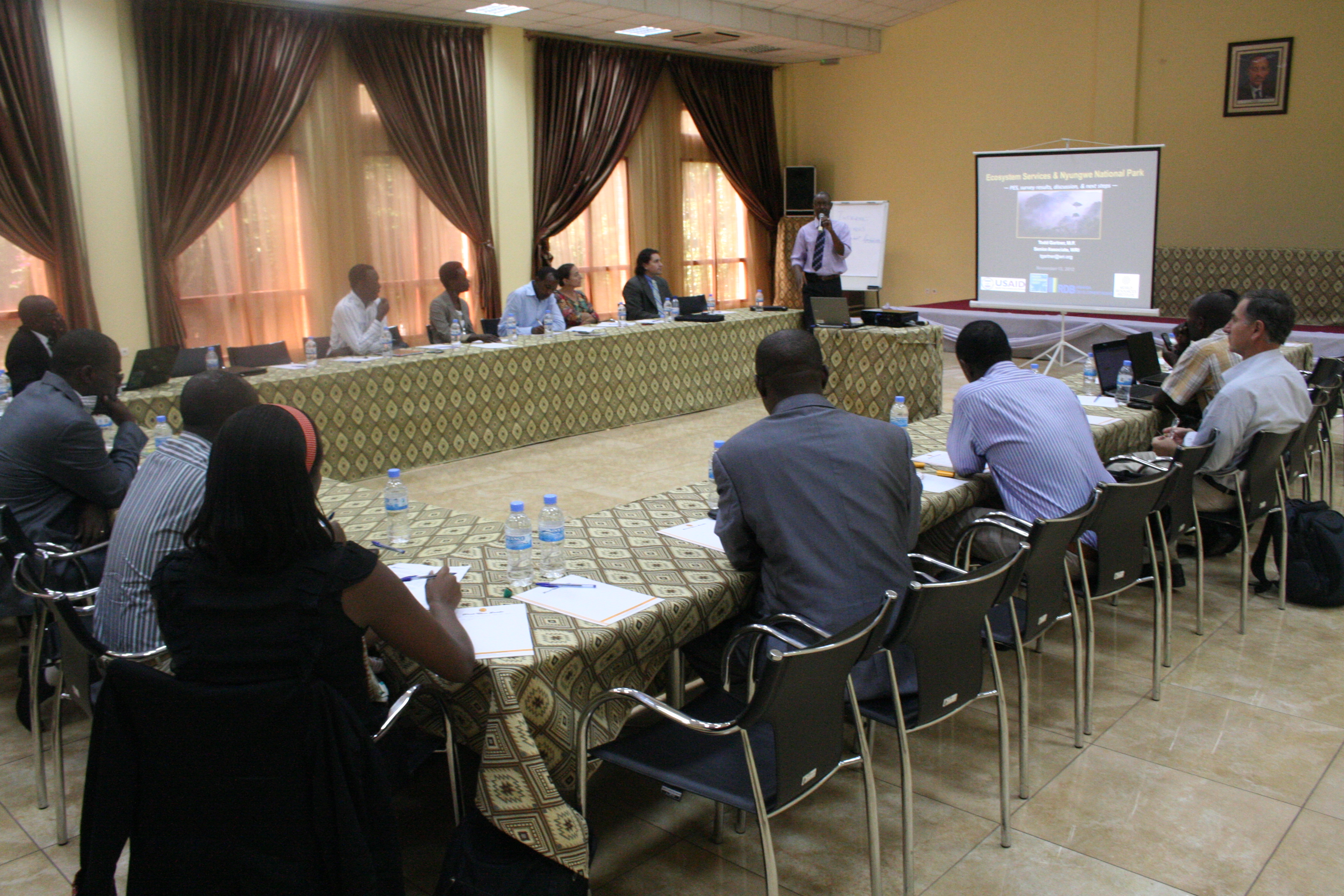Kigali.- A one-day workshop regarding Payment for Ecosystems Services (PES) in the Nyungwe National Park was organized by the Wildlife Conservation Society (WCS) in partnership with the Rwanda Development Board (RDB).
The workshop gathered stakeholders from Rwanda and Burundi, including representatives of development partners’ institutions and representatives of the local communities living near Nyungwe Forest.
The main goal of the forum was to raise awareness of the importance of the forest to all stakeholders, specifically the beneficiaries of the forest’s water reserve, as Nyungwe provides 60% of the country’s water supply and is the source of the Nile River.
The discussion focused on the results of a recent survey commissioned by the WCS in collaboration with RDB. The survey was conducted to record perceptions and understanding of businesses benefitting from Nyungwe National Park.
The results of the survey demonstrated the importance of the forest to businesses, which work in the neighboring areas. For instance, 30% of the respondents, including 75% agribusinesses perceive the importance of Nyungwe in crop pollination, 67% benefit from the tourists which the forest helps to attract, while 50% believe that Nyungwe is important in maintaining good soil quality.
The survey also revealed that only 28% of the respondents pay for the use of water from Nyungwe national Park.
Nyungwe is a natural, mountainous rainforest located in Southwestern Rwanda and Northwestern Burundi. The forest extends into Kibira National Park on the side of Burundi and they both cover 130.000 km2. In Rwanda, Nyungwe has been established as a forest reserve since 1933, and it has received National Park status since 2005.
It is one of the largest mountainous rainforests remaining in Africa, and it is one of the most endemic species-rich areas in all of Africa counting more than 1250 species of plants, including more than 140 types of orchids and more than 240 species of trees; and more than 270 types of animal species including primates, birds, leopards, and antelopes. Nyungwe is also labeled as the Lung of Rwanda.
The forest also supports fundamental ecological functions providing many benefits such as water supply, flood prevention, and sedimentation control. Among other benefits of the forest is the prevention of soil erosion, which protects the agricultural activities around it. The main challenge raised during the forum was to better understand how the beneficiaries pay the services from the natural ecosystem in order to make them sustainable.
The countless benefits of Nyungwe National Park support businesses around the park and rural populations are dependent on the forest, according to Mr. Todd Gartner, Senior Associate at the Water Resources Institute (WRI). He added that the forest is becoming a monetary asset in that it provides among other advantages water, ecotourism and soil fertility. Population growth, changing weather patterns, and increasing demand in water supply have negatively affected reliable water supply and quality and increased the cost of the protection of the watershed.
The survey also highlighted the risks of human activities around the forest as being: (1) high pressure due to population growth; (2) threats caused by the use of pests, hunting, mining, deforestation and firewood collection; and (3) overexploitation of the forest.
As a conclusion, the participants recommended in-depth studies about how to pay the services for natural ecosystems to make them sustainable for the future, and a Task Force for PES was created.
UNDP-Rwanda was invited to this forum as one of the main stakeholders in the area of biodiversity conservation in Rwanda. In fact, UNDP-Rwanda and the Global Environment Fund (GEF) support the preservation of protected areas such as the Nyungwe and Volcanoes National Parks through the Strengthening Biodiversity Conservation Capacity in the Forest Protected Area System of Rwanda project (PAB).
PAB has for main objective to manage sustainably renewable natural resources to protect biodiversity while contributing to equitable economic and social development of all segments of society. Currently in its final phase, the project has been operational from December2006 and is scheduled to close in December 2012.

current selection
UNDP Rwanda
Find Our Offices Around the World.
Get in touch, share your ideas, and discover how we can work together for a sustainable, just, and equitable future.
current selection
UNDP Rwanda
Go to GLOBAL SITEAfghanistan
Albania
Algeria
Angola
Argentina
Armenia
Asia and the Pacific
Azerbaijan
Bahrain
Bangladesh
Barbados
Belize
Benin
Bhutan
Bolivia
Botswana
Brazil
Burkina Faso
Burundi
Cape Verde
Central African Republic
Chad
Chile
Colombia
Comoros
Congo (Dem. Republic of)
Congo (Republic of)
Cook Islands, Niue, Samoa and Tokelau
Costa Rica
Côte d'Ivoire
Cuba
Cyprus
Denmark
Dominican Republic
Ecuador
El Salvador
Equatorial Guinea
Eritrea
Eswatini
Ethiopia
Europe and Central Asia
European Union
Finland
Gabon
Gambia
Geneva
Germany
Ghana
Global Centre for Technology, Innovation and Sustainable Development in Singapore
Global Policy Centre for Governance
Guatemala
Guinea
Guyana
Haiti
Honduras
India
Indonesia
Iran
Istanbul International Centre for Private Sector in Development
Jamaica
Japan
Jordan
Kenya
Kosovo (as per UNSCR 1244)
Kuwait
Lao PDR
Lesotho
Liberia
Libya
Madagascar
Malawi
Malaysia
Maldives
Mali
Mauritania
Mauritius & Seychelles
Mexico
Mongolia
Montenegro
Morocco
Mozambique
Myanmar
Nairobi Global Centre on Resilient Ecosystems and Desertification
Namibia
Nepal
Nicaragua
Niger
Nigeria
North Macedonia
Norway
Pacific Office
Pakistan
Panama
Papua New Guinea
Paraguay
Peru
Philippines
Programme of Assistance to the Palestinian People
Rome Centre
Rwanda
São Tomé and Principe
Senegal
Sierra Leone
Somalia
South Africa
South Sudan
Sri Lanka
Sudan
Suriname
Sweden
Syria
Tajikistan
Tanzania
Thailand
Timor-Leste
Togo
Trinidad and Tobago, Aruba, Curacao and Sint Maarten
Tunisia
Uganda
Ukraine
United States of America
Uruguay
Venezuela
Viet Nam
Zambia
Zimbabwe

 Locations
Locations
